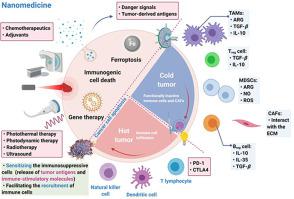Acta Pharmaceutica Sinica B ( IF 14.7 ) Pub Date : 2020-08-27 , DOI: 10.1016/j.apsb.2020.08.010 Yuefei Zhu 1, 2 , Xiangrong Yu 3 , Soracha D Thamphiwatana 4 , Ying Zheng 5 , Zhiqing Pang 2

|
Cancer immunotherapy has veered the paradigm of cancer treatment. Despite recent advances in immunotherapy for improved antitumor efficacy, the complicated tumor microenvironment (TME) is highly immunosuppressive, yielding both astounding and unsatisfactory clinical successes. In this regard, clinical outcomes of currently available immunotherapy are confined to the varied immune systems owing in large part to the lack of understanding of the complexity and diversity of the immune context of the TME. Various advanced designs of nanomedicines could still not fully surmount the delivery barriers of the TME. The immunosuppressive TME may even dampen the efficacy of antitumor immunity. Recently, some nanotechnology-related strategies have been inaugurated to modulate the immunosuppressive cells within the tumor immune microenvironment (TIME) for robust immunotherapeutic responses. In this review, we will highlight the current understanding of the immunosuppressive TIME and identify disparate subclasses of TIME that possess an impact on immunotherapy, especially those unique classes associated with the immunosuppressive effect. The immunoregulatory cell types inside the immunosuppressive TIME will be delineated along with the existing and potential approaches for immunosuppressive cell modulation. After introducing the various strategies, we will ultimately outline both the novel therapeutic targets and the potential issues that affect the efficacy of TIME-based nanomedicines.
中文翻译:

纳米药物调节肿瘤免疫抑制细胞以增强癌症免疫治疗
癌症免疫疗法改变了癌症治疗的范式。尽管最近在提高抗肿瘤疗效的免疫疗法方面取得了进展,但复杂的肿瘤微环境(TME)具有高度的免疫抑制性,取得了令人震惊和不满意的临床成功。在这方面,目前可用的免疫疗法的临床结果仅限于不同的免疫系统,这在很大程度上是由于缺乏对 TME 免疫背景的复杂性和多样性的了解。各种先进的纳米药物设计仍然无法完全克服 TME 的递送障碍。免疫抑制 TME 甚至可能削弱抗肿瘤免疫的功效。最近,一些与纳米技术相关的策略已被采用,以调节肿瘤免疫微环境(TIME)内的免疫抑制细胞,以获得强大的免疫治疗反应。在这篇综述中,我们将重点介绍目前对免疫抑制 TIME 的理解,并确定对免疫治疗有影响的不同 TIME 子类,特别是那些与免疫抑制作用相关的独特类别。将描述免疫抑制 TIME 内的免疫调节细胞类型以及免疫抑制细胞调节的现有和潜在方法。在介绍了各种策略之后,我们最终将概述新的治疗靶点以及影响基于 TIME 的纳米药物功效的潜在问题。











































 京公网安备 11010802027423号
京公网安备 11010802027423号